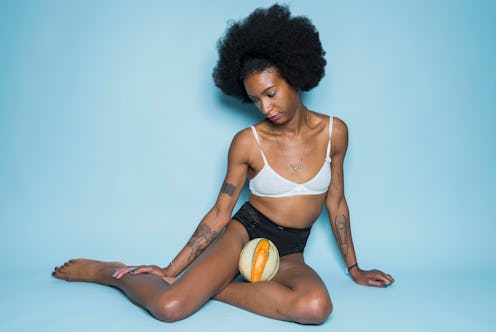Life
7 Things Your OB/GYN Wants You To Know About This Misunderstood Body Part

What do you know about vulvas? The vulva may be one of the most misunderstood body parts on the human body. It’s definitely the most often misnamed. Usually when people talk about that part of the body, they say “vagina.” But it turns out that we’ve all been saying it wrong. The vagina is the canal inside the body, where tampons go. And everything else? All the outside stuff — including the labia minora, labia majora, clitoris, the vaginal opening, and the urethra — is the vulva.
So unless you’re talking about tampons or sexual penetration or having a baby, chances are most of the time when you’re referring to your “vagina,” you really mean to say your “vulva.” And that’s just one of the many things about your vulva that Dr. Sherry Ross, women’s health expert and author of She-ology: The Definitive Guide to Women’s Intimate Health. Period., wants everyone to know about vulvas. Dr. Ross is an OB/GYN who has dedicated her practice to helping women and other people with vulvas understand their body parts, in order to live a healthier and fuller life.
Here are the top things Dr. Ross wishes everyone knew about their vulva. (And just to be clear, while “woman” is used throughout below, it's important to acknowledge that not all women have vulvas and not all people with vulvas are women. All of the advice applies to all people with vulvas, regardless of their gender.)
1Take A Selfie
So many women wonder if their body is normal looking. “You must get to know your vulva and vagina, up close and personal,” Dr. Ross says. "My first and foremost advice to women is to get to know your parts, know what your ‘normal’ is so you will know when a potential problem arises.
Dr. Ross suggests puling out a mirror and getting to know your vulva. "Your vaginal health depends on it," she says.
2Not Everything Is A Yeast Infection
“Of all the infections that can affect the vulva, a yeast infection is the most common,” Dr. Ross says. “It’s estimated that 75 percent of women will experience a yeast infection in their lifetime. But just because you have itching of the vulva doesn’t necessarily mean you have a yeast infection. The vulva can be delicate and temperamental, often affected by everyday routines including diet, medications, stress, fragranced body and laundry soaps, douching and sex, especially if you haven’t had adequate foreplay. Anything that disrupts the pH balance makes the vulva and vagina a not so happy place.”
3Ditch The Panty Liners
“The worst thing a woman can do for the skin of the vulva is wearing a sanitary napkin or panty liner every day to collect accidental loss of urine or normal vaginal discharge that can get on your underwear,” Dr. Ross says. “Sanitary pads and panty liners can disrupt and irritate the skin of the vulva when worn daily. Many are scented with fragrances or contain synthetic materials with chemicals that cause skin dryness and irritation. Vulvar skin dryness and irritation can cause chronic itching of this delicate area of the vagina. A condition called the 'scratch-itch' cycle can occur as a result of wearing sanitary napkins and panty liners every day. Even the most organic and natural panty liners can disrupt the delicate skin of the vulva.”
4You Can Be Allergic To Your Partner’s Sperm
“Being allergic to your partner’s sperm is a rare condition, but it can happen. It tends to be under-diagnosed,” Dr Ross says. “It happens when a woman produces antibodies against certain proteins found in seminal fluid. Symptoms appear 10 to 30 minutes after contact with semen. Depending on where the semen was will determine the symptoms. Symptoms include redness, swelling, pain, itching, blisters and a burning sensation in the vulva.”
5It’s OK To Use Soap On Your Vulva
“The most common misconception of the vulva is that you cannot use soap on the vulva since it may disrupt the vagina’s sensitive pH balance,” Dr. Ross says. “Using the wrong types of soap can cause irritation and bad odor. Avoid soaps which are heavily perfumed, contain too many unnatural ingredients, or have antibacterial properties which upset the natural balance of your body. Using a gentle, non-fragranced soap and natural skin moisturizer daily is ideal, especially ones made specifically for the vulva. Your vulva does need a special cleaning routine and it usually begins with using a non-fragranced soap and warm water.”
6You Can Get Acne On Your Vulva
“A healthy vagina needs hygienic attention similar to the way we care for our face,” Dr. Ross says. “The vulva has sweat glands and hair follicles that are prone to dirt buildup, just like any other of the body with hair and sweat. Between urine, sweat, and being so close to the anus, cleaning the vulva regularly is critical to prevent dirty bacterial buildup which could lead to acne, pimples, rashes, and sores. Keeping the vulva clean with an intimate vaginal wash and preventing dryness of the skin will help avoid unwanted hygiene obstacles.”
7Moisturize Your Vulva
“The skin of the vulva is prone to dryness if not taken care of properly,” Dr. Ross says. “If you don’t moisturize your vulva, the skin will become dry, which can cause irritation, itching, burning and pain. Feminine hygiene products including fragrant soaps, bubble bath liquids, sanitary wipes, laundry detergent, and sexual lubricants are some of the products that lead to vaginal dryness. Extra virgin coconut oil (EVCO) in a warm bath helps naturally moisturizes the vulva helps prevent the disruptive symptoms caused by vaginal dryness. I recommended taking baths with EVCO nightly to prevent dryness.”
So there you go: seven things your OB/GYN wishes you knew about your vulva.